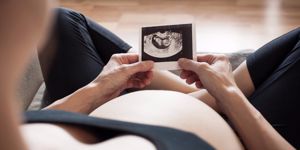Early signs of pregnancy can vary from woman to woman, and you may not even experience the same symptoms from previous pregnancies.
Some women can feel changes in the very early stages of their pregnancy, in the first month or so, while others may not experience anything at all until later on.
Many women's early signs were a missed period, known to be a common pregnancy symptom.
However, it is still very possible that you experience other symptoms that aren't a missed period that could be a telltale sign of pregnancy. To find out more about other early pregnancy symptoms, keep reading below!

When will pregnancy symptoms start?
When exactly pregnancy symptoms begin will vary from person to person, seeing as your first week of pregnancy is calculated based on the date of your last menstrual period.
So even if you weren't actually pregnant in that week, your last period counts as week one of your pregnancy, and so pregnancy symptoms could begin as early as right after that.
However, many women report that they don't experience any symptoms in the first few weeks.
Early pregnancy symptoms
A missed period
A missed period is probably one of the most common pregnancy symptoms. Once conception occurs, your body begins to produce hormones that stop ovulation from happening, meaning that your menstrual cycle will stop. Your period won't arrive again until after the baby is born.
However, some women can still bleed during pregnancy, but this is typically a light period compared to a normal cycle.
Breast Tenderness
Swollen breasts or breasts that feel tender are also part of common early signs of pregnancy. It is the sort of soreness you may experience before your period, just a more intense version of it.
Changes to your breasts could start as early as 1-2 weeks after conception, so you may feel them becoming more sensitive, but as your body begins to become adjusted to the hormonal changes, the tender feeling will fade as well.
Frequent Urination
Needing to go to the bathroom more often than before is also a pregnancy symptom and could be one of the earliest signs, even before a missed period. This is because your body pumps more blood during a pregnancy, which means the kidneys have to filter more of your blood and remove the waste as urine.
As your pregnancy progresses, bathroom trips may continue to increase due to the growing baby and the pressure it places on your bladder.
Increased vaginal discharge
An increase in vaginal discharge is completely normal during pregnancy and may actually be a sign of a healthy pregnancy.
Vaginal discharge helps prevent any infections from moving up the vagina and into the womb.
One of the earliest signs of pregnancy may be an increase in vaginal discharge, which occurs as the old lining of the uterus is shedding to make way for a new one where the egg will be held, and the change in hormones is responsible for this discharge.
Towards the end of the pregnancy, you may find that vaginal discharge increases significantly, but not to worry! This is just one of the ways in which your body indicates that it is almost ready to deliver the baby.
Feeling fatigued
Most pregnant women say that they tend to be extremely tired, especially in the first trimester, due to the increasing levels of progesterone that aims to support your body.
Much like tender feeling breasts, this feeling usually goes away in the second trimester, but it may return closer to when the baby is due to be born.
Morning sickness
Many women experience morning sickness in the first trimester, and it's probably one of the most common early signs of pregnancy.
Despite it being called morning sickness, there's no fixed time when it can happen in the day; it's not just limited to the morning!
For some reason, most women tend to experience sickness or nausea of some kind, even if they aren't physically sick.
This may only last through the first trimester, but other women may feel nauseous throughout their pregnancy.
Dizziness
Dizziness is another early pregnancy symptom due to the fact that your blood pressure levels (normal or high) can drop during pregnancy, and your blood vessels are dilated, which may cause you to feel dizzy.
Raised body temperature
A higher body temperature than normal is also a sign of pregnancy. You may find that when you're exercising or out and about in hot weather, your core body temperature feels higher than usual, which may be due to the increased blood flow in your body.
Constipation
Hormonal changes, abdominal pain similar to those before your period, as well as the pressure on your womb are all reasons why there are changes to your digestive system.
As mentioned before, your progesterone levels increase during pregnancy which, in turn, causes the muscles in your body to begin to relax. And because this includes your intestines, it slows digestion down, which causes constipation.
Headaches
Similar to dizziness, a sudden increase in hormone levels in your body could cause headaches. Along with that, the increased volume of blood flow in your body can also cause symptoms such as fatigue, morning sickness, headaches, and dizziness.
Altered tastes and cravings
How you react to certain foods can also be an early pregnancy indication. Sometimes you begin to have food cravings for something in particular or just a general increase in appetite.
On the other hand, you may also experience food aversions where you start to avoid foods that you may have enjoyed in the past and have suddenly started to taste unpleasant.
Such sudden shifts in the taste of food, good or bad, may also be a sign of pregnancy to look out for.
Cramps and bloating
Along with cramps and bloating, you might also experience light bleeding, often mistaken for a less heavy period.
What is actually happening is that the egg is moving beyond just a group of cells and is beginning to form parts of the baby's organs.
This can cause implantation bleeding, a common pregnancy symptom. You may experience bloating and perhaps mild cramping as part of the symptoms, but again, this varies for different women.
Skin prone to outbreaks
Acne is another common sign of pregnancy, and once again, it is due to changing levels of hormones in your body.
Relating to the skin, an increase in androgens may cause your skin glands to grow, which can produce more sebum. And more sebum means clogging up of pores which may be why you are breaking out.
Mood swings
Another outcome of changing levels of hormones in your body is mood swings, which are often experienced by a lot of women.
Increased levels of estrogen and progesterone mean that you may find that your mood constantly fluctuates and that you're more emotional than usual. Mood swings can cause feelings of extreme highs and then switch to extreme lows throughout the pregnancy.
Do early symptoms of pregnancy go away?
You may find that a lot of the early pregnancy indicators that you experience are limited to only the first trimester, and things like cramping, sore breasts, or dizziness may disappear.
However, other symptoms such as needing to use the bathroom more, nausea, and mood swings tend to fluctuate, and while they may be less intense after the first trimester, they may return later on. Some women experience nausea throughout all 9 months of their pregnancy.
Or in some cases, you may not experience the typical symptoms women go through during the first few months at all. Rather, they begin in the second trimester.
Something like food aversions is an example of something that can constantly change throughout your pregnancy.
When should I take a pregnancy test?
A pregnancy test is probably the most reliable and accurate from the first day of a missed period. This is because your body will have had enough time to produce something called human chorionic gonadotropin (hCG).
This hormone is responsible for telling the ovaries to stop releasing eggs each month which is why you miss your period (or it is delayed). A home pregnancy test is able to detect hCG levels in your urine which can result in a positive pregnancy test.
When should I visit a doctor?
If your period is late or very light, or more commonly, doesn't show up at all, and you've taken a pregnancy test that comes back positive, it's a good time to book an appointment with your doctor.
Here you can take the time to sit down and discuss any medical conditions that might need monitoring, your general health. Your doctor can prescribe you prenatal vitamins with folic acid in them if you haven't already started taking them beforehand.
These specific vitamins with folic acid in them are especially beneficial to the health of the baby as they help with the development of the neural tube, which eventually becomes the spine and the brain, which is why they're important to take.
FAQs
What are first-week signs of pregnancy?
Pregnancy week one signs can vary, but nausea (both with and without vomiting), tender feeling breasts, mild cramps, maybe with some light bleeding or spotting can be signs of pregnancy.
You may have noted that these symptoms are similar to symptoms you may experience before your period.
This is because, as mentioned before, week one of your pregnancy is actually counted from the first day of when you last had your period.
And so, at this point, you may not actually be pregnant, but your body has begun shedding the old lining of the uterus and is forming a new one which is what will hold the fertilized egg.
How do you tell if you're pregnant without a test?
Although a pregnancy test is probably the most reliable way of finding out whether you're pregnant or not, early pregnancy changes in your body can also be a way to find out if you're expecting.
A missed period is probably one of the biggest early pregnancy indicators. Even if it is delayed for a few days or you experience very light spotting, this too could be an indication that you may be pregnant.
Soreness in the breasts and if they feel enlarged or particularly sensitive might be another early indicator of pregnancy.
How accurate are pregnancy tests?
These days, taking a pregnancy test at home is usually pretty accurate. This is because the test is trying to detect in your urine the human chorionic gonadotropin hormone (hCG), which is only produced if you are pregnant.
This hormone could be detected as early as 8 days after your period depending on the test used, and with technology under constant development, some tests are even able to tell you how many weeks you're pregnant.
As long as you follow the instructions correctly and there's been sufficient time between your last missed period for hCG to have begun production, a positive result is usually very accurate, and you can go ahead and book an appointment with your doctor for the next steps.
How early do signs of pregnancy start?
Pregnancy symptoms could start as early as one week after your last menstruation. Symptoms such as sensitive breasts, nausea, and feeling bloated or experiencing cramps can occur in weeks 1-4.
As you might have noted, because these very early pregnancy signs mimic some of those that are experienced just before your period arrives, you may not even realize that you are pregnant in the first few weeks.
As these signs are common, the best way to confirm whether you're pregnant or not is to take a pregnancy test.
Many pregnancy tests these days can not only tell you whether you are pregnant or not but can even tell you how many weeks along you are, which can be useful information to have when visiting the doctor.
Check out the baby milestones blog to keep track of your baby's development every step of the way.

